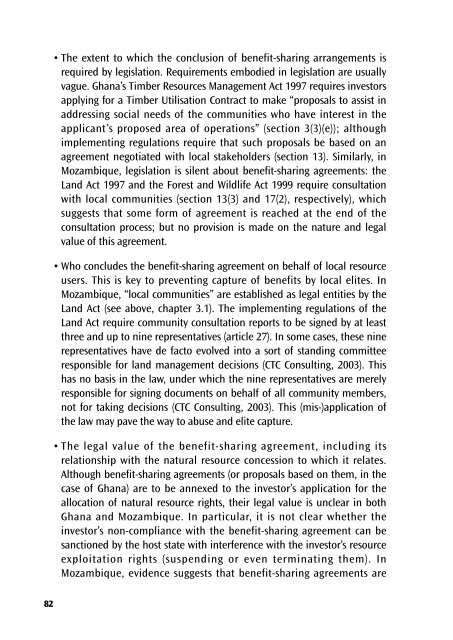Legal empowerment for local resource control
Legal empowerment for local resource control
Legal empowerment for local resource control
You also want an ePaper? Increase the reach of your titles
YUMPU automatically turns print PDFs into web optimized ePapers that Google loves.
82<br />
The extent to which the conclusion of benefit-sharing arrangements is<br />
required by legislation. Requirements embodied in legislation are usually<br />
vague. Ghana’s Timber Resources Management Act 1997 requires investors<br />
applying <strong>for</strong> a Timber Utilisation Contract to make “proposals to assist in<br />
addressing social needs of the communities who have interest in the<br />
applicant’s proposed area of operations” (section 3(3)(e)); although<br />
implementing regulations require that such proposals be based on an<br />
agreement negotiated with <strong>local</strong> stakeholders (section 13). Similarly, in<br />
Mozambique, legislation is silent about benefit-sharing agreements: the<br />
Land Act 1997 and the Forest and Wildlife Act 1999 require consultation<br />
with <strong>local</strong> communities (section 13(3) and 17(2), respectively), which<br />
suggests that some <strong>for</strong>m of agreement is reached at the end of the<br />
consultation process; but no provision is made on the nature and legal<br />
value of this agreement.<br />
Who concludes the benefit-sharing agreement on behalf of <strong>local</strong> <strong>resource</strong><br />
users. This is key to preventing capture of benefits by <strong>local</strong> elites. In<br />
Mozambique, “<strong>local</strong> communities” are established as legal entities by the<br />
Land Act (see above, chapter 3.1). The implementing regulations of the<br />
Land Act require community consultation reports to be signed by at least<br />
three and up to nine representatives (article 27). In some cases, these nine<br />
representatives have de facto evolved into a sort of standing committee<br />
responsible <strong>for</strong> land management decisions (CTC Consulting, 2003). This<br />
has no basis in the law, under which the nine representatives are merely<br />
responsible <strong>for</strong> signing documents on behalf of all community members,<br />
not <strong>for</strong> taking decisions (CTC Consulting, 2003). This (mis-)application of<br />
the law may pave the way to abuse and elite capture.<br />
The legal value of the benefit-sharing agreement, including its<br />
relationship with the natural <strong>resource</strong> concession to which it relates.<br />
Although benefit-sharing agreements (or proposals based on them, in the<br />
case of Ghana) are to be annexed to the investor’s application <strong>for</strong> the<br />
allocation of natural <strong>resource</strong> rights, their legal value is unclear in both<br />
Ghana and Mozambique. In particular, it is not clear whether the<br />
investor’s non-compliance with the benefit-sharing agreement can be<br />
sanctioned by the host state with interference with the investor’s <strong>resource</strong><br />
exploitation rights (suspending or even terminating them). In<br />
Mozambique, evidence suggests that benefit-sharing agreements are

















